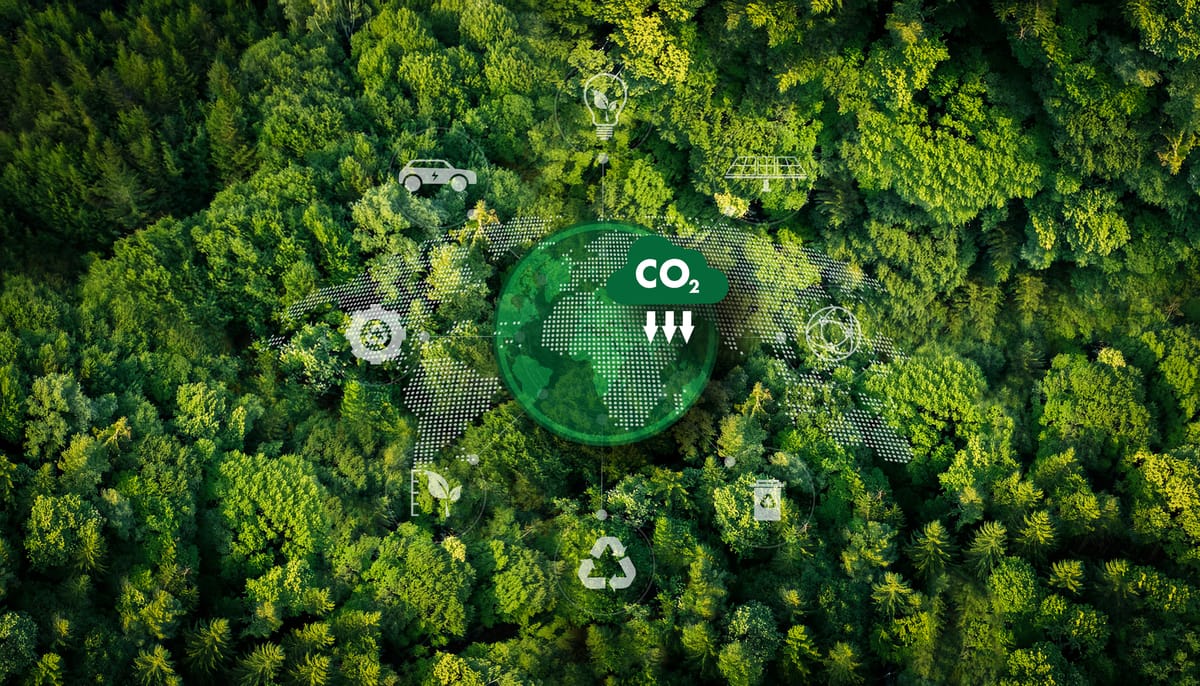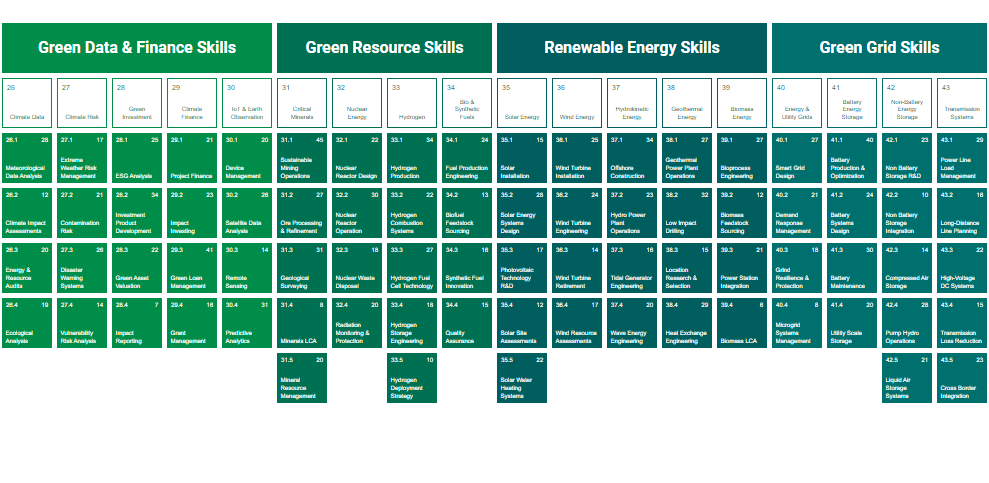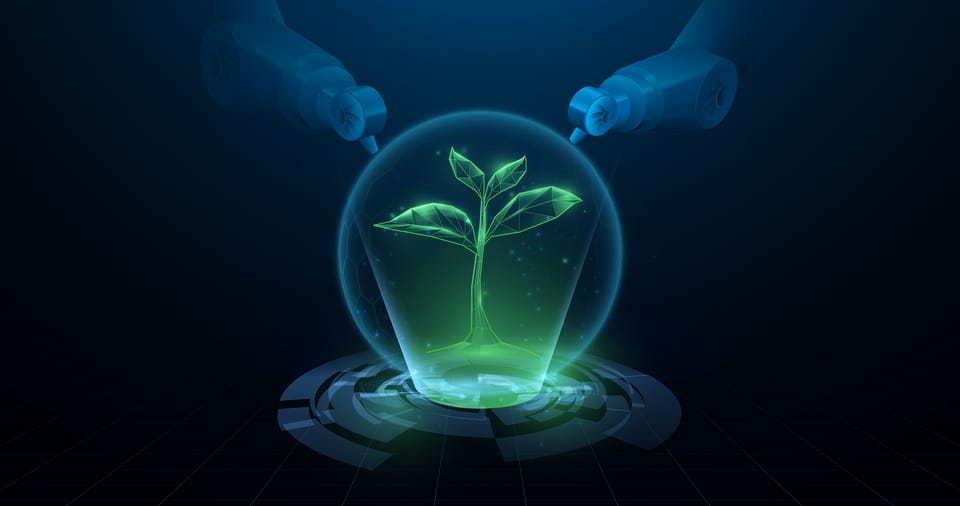⛰️ Enviro Futures #26
HolonIQ's Enviro Newsletter covers the latest developments in food systems, oceans and water, forestry and fishing, and air quality and highlights the week's top skills and environment deals.

Happy Monday 👋
This week's key environmental developments include MIT's creation of a robotic insect for mechanical pollination, addressing challenges from declining bee populations. In response to Africa's water scarcity, the UNDP announced a $2B initiative to improve groundwater access. Meanwhile, the US Department of Energy funds $136M for projects promoting low-carbon food innovations. Silvania launched a $1.5B initiative to protect the Amazon, while microfibre pollution from open-air laundries in India threatens ecosystems and health. In deal activity, BeZero Carbon raised $32M in Series C funding to expand its carbon ratings service, supporting growth in the carbon market.
What's new?
HolonIQ’s new Green Skills Map and Workforce section reveal industry-wide sustainability skills and jobs, as well as workforce development initiatives, supporting upskilling for a sustainable economy.
HolonIQ's new skills newsletter is here! Get updates on emerging skills, workforce shifts, and industry insights across impact sectors. Subscribe now to stay ahead.
🌱 Food Systems
🤖 MIT Develops Robotic Insect for Potential Pollination. Researchers at MIT developed a robotic insect capable of mechanical pollination, mimicking the movements of bees. The lightweight, highly maneuverable robot could address pollination challenges caused by declining bee populations.
🌽 US Farmers Sell Corn as Prices Hit 8-Year High. Corn prices surged to their highest level in nearly a decade, prompting US farmers to sell significant portions of their crops. The price rally, caused by extreme heat damaging crops in key regions like the US and Brazil, has increased market volatility and underscored the sensitivity of agricultural commodities to global supply and demand.
🌱 Seed Preservation Project for Climate Change. A groundbreaking initiative employs climate analog mapping to safeguard biodiversity in agriculture. By identifying future climate-resilient environments, native seeds are sent to regions predicted to match their current conditions as climate change progresses. This approach ensures the preservation of plant species critical to global food security, marking a pivotal development in sustainable agriculture.
🌊 Oceans and Water
💧 UNDP Groundwater Access Facility Announces $2B Pipeline. The United Nations Development Programme (UNDP) introduced the Groundwater Access Facility (GAFa) at an event in Riyadh, Saudi Arabia, as a potential solution to drought and water scarcity in Africa, with a $2B pipeline announced.
💧 Water Loss from Mavrokolympos Dam Impacts Paphos. A fault in the Mavrokolympos Dam caused the loss of 2.18 million cubic meters of water, posing challenges for Paphos. This represents a significant portion of the region's water reserves, highlighting vulnerabilities in infrastructure and the pressing need for maintenance and resource management solutions.
🚰 Water Organizations Collaborate on AI Research Project. Several major water organizations, including AWWA, WEF, WRF, and KEC, launched a joint research project to study the role of generative AI applications in the global water sector, aiming to leverage AI to enhance resource management, improve infrastructure efficiency, and address challenges in water distribution and conservation.
♻️ Environmental Services
🌱 DOE Grants Millions for Low-Carbon Food Innovation. The US Department of Energy announced over $136M in funding for 66 projects to advance low-carbon food technologies. The funding supports efforts to reduce emissions in food production, including precision fermentation and sustainable ingredient development, fostering a more environmentally friendly food system. Companies like Tender Food and Ginkgo Bioworks received grants.
🌎 Researchers Develop CO2 Capture Membrane. Researchers developed a cost-effective carbon capture method that enhances the efficiency of CO2 removal from the atmosphere. This breakthrough technology uses inexpensive materials and processes, offering a scalable solution to combat climate change and reduce greenhouse gas emissions.
♻️ Bühler Enhances Plastic Recycling with AI and Polymer Detection. Bühler Group is utilizing AI, advanced cameras, and polymer detection technology to revolutionize plastic recycling. The company aims to reduce waste and enhance resource efficiency by transforming plastic waste into valuable resources, driving sustainable manufacturing solutions.
🐟 Forestry and Fishing
🌳 Silvania Launches $1.5B Amazon Protection Initiative. Silvania, a carbon markets investor backed by Mercuria, launched a $1.5B initiative aimed at protecting the Amazon rainforest, focusing on large-scale conservation efforts to preserve biodiversity and mitigate deforestation. This initiative involves a series of strategies and partnerships designed to address environmental challenges and promote sustainable land-use practices in the region.
🌳 DRC Creates Massive Tropical Forest Reserve. The Democratic Republic of Congo is creating the world's largest protected tropical forest reserve, promoting conservation and sustainable development to benefit local communities.
🐟 Thai Farmers Demand Action on Invasive Fish Outbreak. Farmers in Thailand are urging the government to address the growing issue of invasive fish species that have severely impacted freshwater ecosystems and the aquaculture industry. They are pushing for restoration measures to prevent further ecological disruption caused by these non-native species.
💨 Air Quality
🌍 Microfibre Pollution from Open-Air Laundries in India. Open-air laundries in India, known as dhobi ghats, are becoming a hotspot for airborne microfibres released from clothes during traditional washing. These tiny pollutants pose risks to human health and ecosystems, contributing to the global air pollution crisis. Potential solutions include using filters and biodegradable detergents.
😷 Air Pollution Monitoring Gaps Leave Millions at Risk. Despite stricter EPA standards, government air pollution sensors are falling short, leaving millions in 'blind spots' and prompting people to buy their monitors to protect against particulate pollution linked to serious health risks.
🛠️ Skills and Workforce
HolonIQ is now tracking reskilling and upskilling initiatives that are critical in bridging workforce gaps. Impact industries are rapidly evolving, fueled by technological advancements, decarbonization, geopolitical dynamics, and socio-economic factors. These sectors require considerable workforce/professional development initiatives to enhance workers' capabilities, boost economic growth, and promote social well-being. Read on for this week’s insights, and discover more in HolonIQ's latest Skills newsletter.
🍃 US Department of Energy Funds Non-Profits to Develop Clean Energy Workforce. The US Department of Energy’s Clean Energy Careers for All (CEC4A) program awarded up to $300,000 to seven non-profits promoting clean energy careers through STEM education, internships, and mentorship. Key initiatives include green building workshops (California Green Building Council), Zero Emission Vehicle training (EVHybridNoire), and geothermal virtual reality training (New Mexico Institute of Mining & Technology). Top performers may receive an additional $750,000 in Phase 2 funding.
📈 UNICEF and Muslim World League Launch $1.5M Green Skills Program in Pakistan. UNICEF and the Muslim World League, supported by the Special Investment Facilitation Council (SIFC), have launched a Green Skills training program in Pakistan to equip disadvantaged youth with sustainable development and digital skills. The initiative enhances employability in green sectors, building on a 14-year partnership between UNICEF and the Muslim World League. Aligned with UNICEF’s mission, it promotes education, child welfare, and economic growth, while SIFC ensures effective implementation to address youth unemployment and bridge critical skills gaps.
🌱 Cardiff Council Unveils Ambitious Green Development Plan for 2036. Cardiff Council's new “Deposit Plan” aims to create over 32,000 jobs by 2036, aligning with the city’s One Planet Strategy. The plan emphasizes sustainable growth, including low-carbon developments, energy-efficient buildings, and renewable energy expansion. It supports diverse employment opportunities by protecting existing sites and introducing new hubs in Cardiff Central Zone, Roath Basin, and other strategic areas. The initiative also prioritizes sustainable transport, active travel, biodiversity, and ecosystem resilience.

HolonIQ has launched the Green Skills Map, an open-source framework initiated for cataloging, evaluating, and contextualizing the different components of the rapidly expanding field of green jobs. This comprehensive taxonomy will serve as a resource for understanding the full spectrum and complexity of green skills required across various sectors, thereby enabling a cohesive approach toward achieving net zero and decarbonizing the global economy. Green Skills Map spans 11 areas, 54 sub-areas, and 243 green skills clusters. A snippet of the map covering four areas has been included above. Explore the full map on greenskills.org.
💰 Environment Deals
🌳 BeZero Carbon Raises $32M in Series C Funding. BeZero Carbon, a leading carbon ratings agency, announced a successful $32M Series C funding round led by GenZero to expand its coverage of growing carbon markets and enhance its operations.
💰 Faircraft Raises $15.8M for Lab-Grown Leather. Faircraft, a company specializing in lab-grown leather, raised $15.8M in funding led by a consortium of investment funds. The funding will support Faircraft's innovative tissue engineering techniques.
🌱 Project Eaden Raises $15.5M for Plant-Based Meat Production. Germany’s Project Eaden raised $15.8M in Series A funding to advance its fiber-spinning technology, aiming to enhance the texture and quality of plant-based ham.
🌳 Origen Secures $13M Series A for Limestone-Based Carbon Removal. Origen Power Limited, a carbon removal company, secured $13M in Series A funding to deploy its limestone-based direct air capture technology that removes carbon dioxide from the atmosphere.
🌳 Daphne Technology and Williams Win DOE Grant for Emissions Reduction Project. Daphne Technology and Williams have been awarded a $6M grant from the US Department of Energy to develop a process for reducing emissions from power plants and industrial facilities by capturing carbon dioxide.
Like getting this newsletter? For unlimited access to over one million charts, request a demo.
Thank you for reading. Have a great week ahead!
Have some feedback or suggestions? Let us know at hello@holoniq.com



